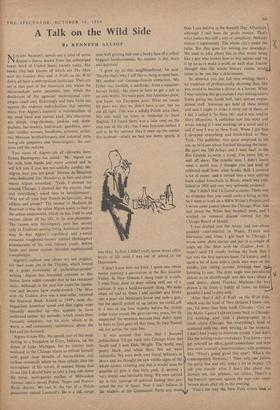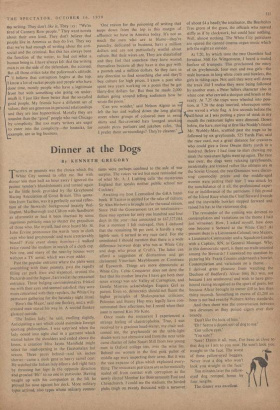A Talk on the Wild Side
By KENNETH ALLSOP
NELSON ALOREN's novels are a kind of serial Beggar's Opera drawn from the submerged lower third of United States society today. His books (the best known of which are The Man with the Golden Arm and A Walk on the Wild Side), all have a metropolitan landscape. They are set in that part of the American city where the status-seekers never penetrate, into which the death-rays of the agencies' motivational cam- paigns reach only flickeringly and then fizzle out against the endemic individualism that survives there. For Algren's material is individualism of the most lurid and eternal kind. His characters are pimps, crap-shooters, junkies and dope- pushers, bar-tenders, lush-heads, gamblers, dere- licts, hustlin' women, hoodlums, jazzmen, mulat- tos, Mexican brothel-keepers and coloured tarts, low-grade gangsters and blues-singers: the out- casts and the outlaws.
Two views of Algren are of relevance here. Ernest Hemingway has stated : `Mr. Algren can hit with both hands and move around and he will kill you if you are not awfully careful. Mr. Algren, boy, you are good.' Simone de Beauvoir (who dedicated The Mandarins to him and about whom Algren remarked : 'Yeah, I showed her around Chicago. I showed her the electric chair and everything') asked him in bewilderment : 'Why are all your best friends pickpockets, drug addicts and pimps?' The answer to Madame de Beauvoir is that the value Algren seems to find in the urban underworld, which he has lived in and written about all his life, is its non-phoniness. The reason why Hemingway puts him second only to Faulkner among living American writers may be that Algren's a-political and a-social romantic roughneck-heroes remind Hemingway nostalgically of his own literary youth, before Spain and social realism intruded sophisticated complexities.
Algren's outlook and idiom are not original, for their roots are in the Thirties, which forced up a great movement of 'proletarian-protest' writing. Algren has remained constant to this theme. Some might consider that he has remained static. Although in the past few years his reputa- tion and income have mushroomed—The Man with the Golden Arm was a best-seller, received the National Book Award as 1949's most dis- tinguished American novel and film rights were instantly snatched up--this appears to have mellowed neither his attitudes, which retain their romantic simplicity, nor his style, which at its worst is self-consciously sentimental about the lost and the damned.
Algren is now fifty. He spends part of the week writing in a bungalow in Gary, Indiana, on the dunes of Lake Michigan, but he returns each weekend to the Chicago slums to refresh himself with good deep breaths of booze-fumes and carbon monoxide which he then exhales into the atmosphere of his novels. It seemed fitting that to see him I should have to take a long ride down the bleak, neon-gaudy reaches of Milwaukee Avenue into a mixed Polish, Negro and Puerto- Rican district. We met in the bar of a Polish restaurant named Leonard's. He is a tall, rangy man with greying hair and a beaky face of a rather haggard handsomeness; his manner is shy, wary and quizzical.
'1 grew up in this neighbourhood.' he said. 'Maybe that's why I still like to hang around here. My mother was German-Jewish extraction. My father was Swedish, a mechanic, from a squatter- farmer family. He came in here to get a job at an auto works. We were poor, but American poor, you know, not European poor. What we meant by poor was that we didn't have a car, but we ate all right. This was a solidly Polish area then. No one went up town or bothered to learn English. I'd heard there was a lake over on the east side of the city, but I was fourteen before I saw it. in the summer they'd open up the corner fire hydrant--where we had our water sports. It was okay. In fact, I didn't really know about other levels of life until I was out of school in the Depression.
`I don't know how we lived. I spent one whole winter running a gas-station in the Rio Grande Valley. In New Orleans 1 slung hash in a cafe. 1 went from door to door selling stuff out of a suitcase. It was a hand-to-mouth thing. We stole when we had to. Once 1 and another guy broke into a poor old Mexican's house and stole a gun, but the sheriff picked us up before we could sell it. I was in jug four months before the circuit judge came round. He gave me two years, but he suspended the sentence because they didn't want to have to feed guys all that time. So they floated me out across the state line.
'It was around that time that I became politicalised. I'd got back into Chicago from the South and I met Dick Wright. The world was pretty black and white then, but we were optimistic. We were both very literal believers in Marx and we thought we saw visible signs of the whole system tottering and that it would soon be possible to give it that little push. It seemed a very simple and inevitable thing. We were carried up in that upsurge of political feeling that pre- ceded the war in Spain. Now I can't believe in the wisdom of the Communist Party any mor than I can believe in the Seventh Day Adventists,\ although 1 still hate the profit motive. That's what makes this still a city of complicity. Nobody makes it legitimately. The whole city's under the table. But that goes for writing too nowadays. We used to joke about this or that writer being like a guy who knows how to buy salami and cut it up so as to make a profit on each slice. 1 never thought that the whole literary racket would come to be run like a delicatessen.
'In America you just fall into writing; there's no tradition of professionally choosing that, like you would to become a doctor or a lawyer. When I was running this gas-station I was writing letters home giving the South hell, very serious impas- sioned stuff. Someone got hold of these letters and said I ought to make a story out of them, so I did. I called it `So Help Me' and it was used in Story Magazine. A publisher saw this story and wrote asking if I was working on a novel and to call if ever I was in New York. When I got that I dropped everything and hitch-hiked to New York. The publisher was quite surprised to see me, as he'd just about finished dictating the letter. He gave me 100 dollars and I went back to the Rio Grande to write a novel. I've never felt so well off since. The trouble was, I didn't know what a novel was. I thought you just kind of collected stuff from other books. Still, I covered a lot of paper, and it turned into a very curious book called Somebody in Boots, which was pub- lished in 1936 and was very seriously reviewed.
'But I didn't feel I'd found a career. There was no evidence that you could make a living at this. So I went to work on a WPA Writer's Project, and I wrote some poetry about the Chicago West Side and about the White Sox baseball team, and I worked on venereal disease control for the Chicago Board of Health.
`I was drafted into the Army, and just about avoided court-martial in Wales, France and Germany, and when I got back to Chicago I wrote some short stories and put in a couple of years on The Man with the Golden Arm. It wasn't until I'd mostly written the book that I ran into the first narcotic-users I'd known, and I spent a lot of time with a circle who were on the needle, just sitting around drinking beer aa1;1.. listening to jazz. The dope angle was introduced almost as an afterthought into this story about a card dealer, about Frankie Machine—he was drawn a bit from a buddy of mine, an Italian gambler I used to play with.
'After that I did A Walk on the Wild Side, which was the kind of New Orleans 1 knew—oh, yes, I'd done that little book Chicago: City on the Make. I guess I always come back to Chicago. I'm working, now, with a photographer on a book about Chicago, but everything's kind of scattered with me, with writing, at the moment. 1 don't find it easy to orientate myself. I just don't like the writing racket nowadays. You know—you get yourself an office, good connections, and then you write yourself a memorandum, with questions like "What's going good this year? What's the contemporary formula?" Then you just follow the party line and you make a lot of money. I'll tell you exactly what I don't like about our literary set, our arbiters, our critics. There's a big boycott operates against the man who wears brown shoes after six in the evening.
`That's the way the New York critics look at my writing. They don't like it. They f...ty : "We're tired of Cannery Row people." They want novels about their own kind. They don't believe that people live in America as they do live. They say that we've had enough of writing about the anti- social and the criminal. But this has always been the function of the writer, to find out what a human being is. I have always felt that the writing man is on the side of the defendant, the accused. But all those critics take the policeman's attitude. I 'I believe that corruption begins at the top. I know a lot of racket people and people who have done time, mostly people who have a legitimate front but with something else going on under- neath it. I just like them better than the so-called good people. My friends have a different set of values; they are generous in personal relationships and they are less hypocritical. Morally they are sounder than the "good" people who run Chicago by complicity. But too many writers are eager to enter into the complicity—the beatniks, for example, are in big business.
`One reason for the poisoning of writing that seeps down from the top is this margin of affluence we have in America today. It's not so much the men who are to blame—they're paunchy, dedicated to business, have a million dollars and are not particularly wistful about culture. But their wives are. They are dissatisfied and they feel that somehow they have wasted themselves because all they have is this guy with a paunch and a million dollars. So they turn in any direction to find something else and they'll buy culture for high prices. I know a poet who spent two years working on a poem that he got thirty-five dollars for. But then he made 2,000 dollars going around telling audiences how he wrote the poem.'
'Can you wonder,' said Nelson Algren as w left the bar and walked down the long glarin street where groups of coloured men in swe shirts and flat-crowned hats lounged smok in outside pizza parlours and jukebox cafes, `tha I prefer these surroundings? They're cleaner.'







































 Previous page
Previous page